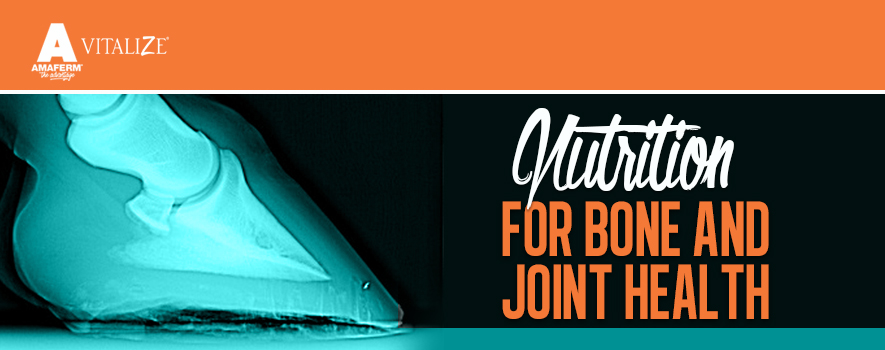Adequate nutrition is essential for everything from keeping a horse’s coat shiny to maintaining healthy bones and joints. Although it may often be overlooked, there are several key nutrients that yield good bone and joint health in horses. These include:
Calcium – Likely the most logical nutrient for bone health, calcium is a mineral that is incorporated into bones and makes them strong.
Vitamin D – The body requires vitamin D to absorb calcium, making it essential for bone health. Horses fed sun-cured or exposed to sunlight often do not have a dietary requirement for vitamin D.
Phosphorous – Phosphorous works with calcium to help build bones. The ratio of calcium to phosphorous is important and should be between 1:1 and 2:1.
Magnesium – Magnesium improves the absorption of calcium in the body and is needed for mineralization of bones.
Sulfur – Sulfur is required for the generation of joint cartilage. In fact, MSM, a common ingredient in joint supplements, is simply an organic form of sulfur.
Vitamin E – A natural antioxidant, vitamin E is important for helping reduce free radicals from oxidative stress that causes damage to joints.
Vitamin C – Vitamin C has antioxidant and immunomodulation effects and is a cofactor for the synthesis of collagen.
Amino acids – Amino acids are required for building collagen and connective tissue. Some of the most important amino acids for bone and joint health are methionine, arginine, and histidine.
Omega 3 – Omega 3 fatty acids produce compounds called resolvins and protectins, which help to reduce inflammation throughout the body.
Zinc – Zinc is essential for bone metabolism and aids in the production of collagen.
Selenium – Selenium is an important part of the cellular antioxidant defense system and is also intricately linked to the function of vitamin E.
It is important to keep in mind that over-supplementing many of these vitamins and minerals can actually be harmful to your horse or, in some cases, even toxic. The required amount of each nutrient has been determined by the National Research Council (NRC) and can be read online at http://www.nap.edu/read/11653/chapter/1. If you find your horse is not getting enough of multiple nutrients, you may want to consider providing a vitamin and mineral supplement like Vitalize® Equine High Performance or Vitalize Equine Free Choice.


